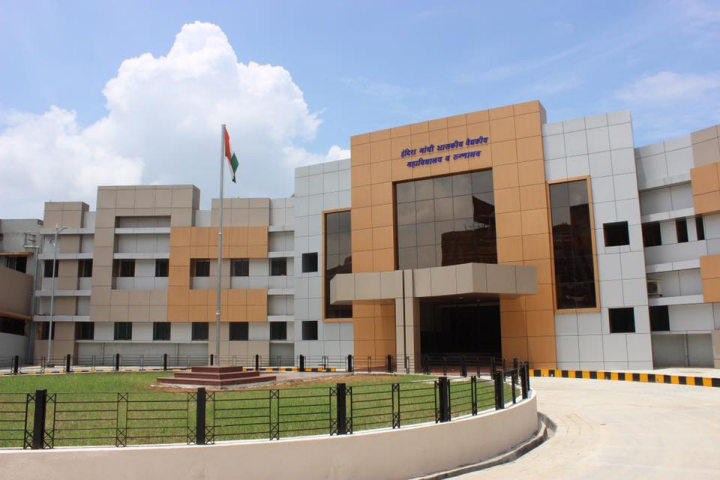
Indira Gandhi Medical College & Hospital, Nagpur
Mission & Vision
Medical Education is the mother of Health care services existing the state. The doctors are created from the new entrants in the college. The processed ‘good’ should be a high quality, sincere, dedicated and compassionate fellows. At the same time they should possess state of Art knowledge of Medicine and capable of withstanding the competition in the field. We don’t produce patient examination machines but good human beings who render necessary moral support to the patients and relatives in addition to the treatment needed.
Dr. Leela Gul Abichandani
Office. 0712-2728621,2770929
Medical Superintendent Contact details
Dr. Abhishek Somani
Office Phone.:0712-2725274, 2770929
Administrative Officer
Mr Arun Puran Dhurve
Administrative Officer - College, IGGMC, Nagpur
Office: 0712-2820201
Email Address: - igmcn@rediffmail.com
Mr Girish Narayanrao Karwate
Administrative Officer - Hospital, IGGMC, Nagpur
Office: 0712-2820201
Email Address: - igmcn@rediffmail.com
Casualty
Casualty Medical Officer – 0712 2820100
Anti Ragging Helpline No.
Toll Free – 1800-180-5522
Landline number: - 0712 – 2725274 (P), 2770929 (P) Email Address: - igmcn@rediffmail.com
anti Ragging Committee
Chairman- Dr. A. Saoji, Associate Professor, Dept of Psychiatry- 9823123457
Member- Mr. Arun Dhurve, Administrative Officer, IGGMC, Nagpur-
PBX
0712-2728621-27
Fax
0712-2728028 (College)
0712-2774766 (Hospital)
Diploma in Anaesthesia
Bhabha Atomic Research Centre,Mumbai
M.B.B.S.

Bachelor of Medicine, Bachelor of Surgery (Latin: Medicinae Baccalaureus, Baccalaureus Chirurgiae; abbreviated in many ways, most commonly MBBS, but also MB ChB, BMBS, MB BCh, MB BChir), is the primary medical degree awarded by medical schools in countries that follow the tradition of the United Kingdom. The historical degree nomenclature states that they are two separate undergraduate degrees. In practice, however, they are usually combined as one and conferred together, and may also be awarded at graduate-level medical schools.
Bachelor of Medicine and Bachelor of Surgery (MBBS), is a professional degree in medical science. A person holding the MBBS degree becomes a certified medical practitioner. The duration of MBBS course is five years and six months including one year of rotational internship at hospitals, health centres, and health camps organised by non-profit organisations (NGOs). MBBS course syllabus includes studies on anatomy, pharmacology, pathology as well as community health & medicine, paediatrics, and surgery. The syllabus, prescribed in such a way that MBBS degree holders can choose a specialisation for further majoring and practising medicine. The career specialisations for MBBS students are Nephrology, Cardiology, Gynecology, Anesthesiology, Organ Transplant, Endocrine, and General Surgery, etc.
MD - Anaesthesiology
The purpose of PG education is to create specialists who would provide high quality health care and advance the cause of science through research & training. A post graduate specialist having undergone the required training in anesthesiology should be able to recognize the health needs of the community. He or she should be competent to handle effectively medical problems and should be aware of the recent advances pertaining to his/her specialty. She/he should be highly competent anesthesiologist with broad range of skills that will enable him/her to practice anesthesiology independently. The PG student should also acquire the basic skills in teaching of medical/para-medical students. She/he is also expected to know the principles of research methodology and modes of consulting library. She/he should attend conferences, workshops and CMEs regularly to upgrade his/her knowledge. The purpose of this document is to provide teachers and learners illustrative guidelines to achieve defined outcomes through learning and assessment. This document was prepared by various subject-content specialists. The Reconciliation Board of the Academic Committee has attempted to render uniformity without compromise to purpose and content of the document. Compromise in purity of syntax has been made in order to preserve the purpose and content. This has necessitated retention of “domains of learning” under the heading “competencies”
MD - Bio-Chemistry
MD - Forensic Medicine/Forensic Medicine & Toxicology
MD - General Medicine
MD - Microbiology
MD - Paediatrics
MD - Pathology
MD - Pharmacology
MD - Physiology
MD - Radio Diagnosis/Radiology
MD - Social & Preventive Medicine / Community Medicine
MD - Tuberculosis & Respiratory Diseases / Pulmonary Medicine
MD/MS - Anatomy
MD/MS - Obstetrics & Gynaecology
MD/MS - Ophthalmology
MS - ENT
MS - General Surgery
MS - Orthopaedics
- Log in to post comments
- 49 views
